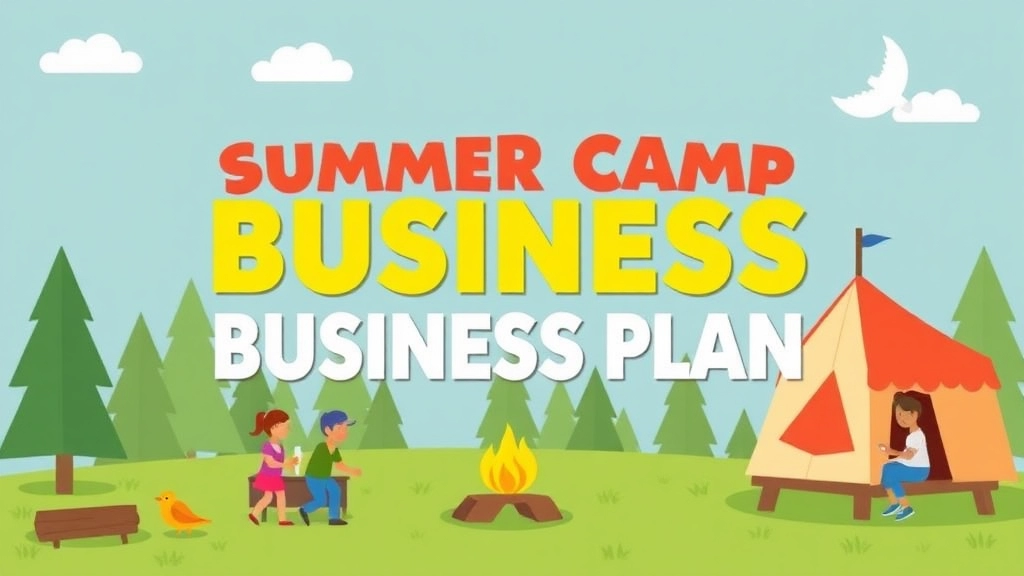Starting a summer camp is a rewarding venture, but it requires a solid business plan to succeed. A well-crafted summer camp business plan addresses key considerations such as market research, financial planning, and securing necessary permits. Understanding your target audience and crafting a unique value proposition can set your camp apart from competitors. It’s essential to develop engaging program offerings and hire trained staff to ensure a memorable experience for campers.
Effective marketing and promotion strategies are crucial for growth. Competitive pricing and robust safety protocols will build trust with parents and guardians. Implementing performance measurement tools can help identify growth opportunities and refine your camp’s offerings. By focusing on these core areas, you can create a successful and sustainable summer camp business.
Key Considerations for Starting a Summer Camp
So, you’re thinking about starting a summer camp, huh? It’s an exciting venture, but let’s be realâit’s not all sunshine and s’mores. There are some key considerations you need to tackle first. Trust me, you don’t want to dive in unprepared.
Why Start a Summer Camp?
Before we get into the nitty-gritty, let’s address the big question: Why start a summer camp? Maybe you love working with kids, or perhaps you see a gap in the market. Whatever your reason, it’s crucial to have a clear âwhyâ to keep you motivated when things get tough.
Common Concerns
Here are some of the real questions and worries you might be facing:
- How much will it cost?
- What kind of permits and licenses do I need?
- How do I ensure the safety of the kids?
- What activities should I offer?
These are all valid concerns, and we’ll tackle each one. But first, let’s break down the key considerations into bite-sized chunks.
Location, Location, Location
Choosing the right location is crucial. You want a place that’s:
- Safe and accessible
- Equipped with necessary facilities (think bathrooms, dining areas, and activity spaces)
- Scenic and inspiring (because who wants to camp in a parking lot?)
Legal Stuff
No one likes paperwork, but you’ve got to get your legal ducks in a row. This includes:
- Permits and Licenses: Check local regulations and get everything in order.
- Insurance: This is non-negotiable. You need coverage for accidents, property damage, and more.
Budgeting
Money talks, and in this case, it screams. You need a solid financial plan:
- Initial Costs: Land, facilities, equipment, and marketing.
- Ongoing Costs: Staff salaries, utilities, food, and supplies.
- Emergency Fund: Always have a cushion for unexpected expenses.
Safety First
Safety isn’t just a buzzword; it’s a necessity. Here’s what you need:
- Trained Staff: Make sure everyone knows first aid and emergency procedures.
- Secure Facilities: Regular checks and maintenance are a must.
- Clear Policies: Have rules and guidelines for both staff and campers.
Program Offerings
Your camp needs to stand out. Think about:
- Unique Activities: What can you offer that others don’t? Maybe it’s a specialised sports program or arts and crafts.
- Age Groups: Tailor your activities to different age ranges to keep everyone engaged.
Staffing
Your staff can make or break your camp. Look for:
- Experience and Passion: You want people who love working with kids.
- Training: Provide comprehensive training to ensure everyone is on the same page.
- Background Checks: Safety first, remember?
Marketing
You could have the best camp in the world, but if no one knows about it, it’s all for nothing. Focus on:
- Social Media: Engage with parents and kids where they spend their time.
- Word of Mouth: Encourage satisfied parents to spread the word.
- Local Partnerships: Team up with schools and community centres.
For a more detailed guide on how to start your camp, check out our complete guide to starting a summer camp. And don’t forget to ensure you have the right insurance coverage to protect your investment and campers.
Market Research and Target Audience Identification

Ever wondered who’s going to sign up for your summer camp?
Let’s dive into some market research and figure out your target audience.
Why Market Research Matters
First off, you need to know if there’s even a demand for your camp.
Otherwise, you’re just throwing darts in the dark.
Here’s why market research is crucial:
- Identify Demand: Are parents in your area looking for summer camps?
- Understand Competitors: What are other camps offering?
- Spot Trends: What activities are kids into these days?
Steps to Conduct Market Research
- Surveys and Questionnaires
- Ask parents and kids what they want.
- Use online tools like Google Forms.
- Competitor Analysis
- Check out other camps’ websites.
- Look at their reviews on social media.
- Community Feedback
- Attend local events and talk to families.
- Join community forums and groups.
Defining Your Target Audience
Once you’ve got your data, it’s time to pinpoint your audience.
Who are they?
- Age Group: Are you targeting toddlers, teens, or somewhere in between?
- Interests: Are they into sports, arts, or tech?
- Location: Are they local or willing to travel?
Example:
Imagine you’re running a tech camp.
Your target audience might be:
- Kids aged 8-14
- Interested in coding and robotics
- Living within a 20-mile radius
Creating Personas
To make it even easier, create personas.
Think of them as your ideal campers.
Example Persona:
- Name: Techie Tom
- Age: 12
- Interests: Coding, video games, and robotics
- Parent’s Concerns: Safety, educational value, and cost
Why It’s Important
Knowing your audience helps you:
- Tailor Your Marketing: Speak directly to their needs.
- Design Relevant Activities: Keep them engaged and excited.
- Set the Right Price: Make it affordable for your target market.
Crafting a Unique Value Proposition
Alright, let’s get down to it. Crafting a unique value proposition (UVP) for your summer camp is like finding that secret sauce that makes your camp stand out from the rest. I know, you’re probably thinking, âWhat makes my camp special?â or âHow can I make parents choose my camp over others?â These are the real questions that keep you up at night, and trust me, you’re not alone.
What is a Unique Value Proposition?
A UVP is basically your camp’s promise to parents and kids. It’s what makes your camp different and better than the others. Think of it as your camp’s superpower.
Why is a UVP Important?
- Attracts the Right Audience: You want kids who are super excited about what your camp offers.
- Builds Trust: Parents feel confident knowing your camp has something special.
- Increases Retention: Kids will want to come back year after year.
How to Craft Your UVP
- Identify Your Strengths:
- What are you best at?
- Is it your killer sports programme, arts and crafts, or maybe your focus on STEM?
- Know Your Audience:
- Who are you targeting?
- Are they adventure-seekers, budding artists, or tech enthusiasts?
- Solve a Problem:
- What problem does your camp solve for parents and kids?
- Maybe it’s keeping kids active during the summer or providing a safe space to make new friends.
- Be Specific:
- General statements like âWe’re the best campâ won’t cut it.
- Say something like, âWe offer the only summer camp with a robotics programme led by industry experts.â
Examples of Strong UVPs
- Adventure Camp: âOur camp offers unique wilderness survival skills that turn kids into confident adventurers.â
- Tech Camp: âWe provide hands-on coding workshops with real-world applications, turning screen time into learning time.â
- Arts Camp: âOur programme is led by professional artists, helping kids unlock their creative potential.â
Real-Life Story
Let me share a quick story. I once met a camp director who was struggling to fill spots. She realised her camp was just like every other camp out there. After some brainstorming, she decided to focus on eco-friendly practices and outdoor education. Her new UVP? âThe only camp where kids learn to be eco-warriors while having fun.â Parents loved it, and her spots filled up in no time.
Financial Planning and Budgeting Essentials

Alright, let’s get down to brass tacks.
Financial planning and budgeting are the backbone of any successful summer camp.
Without it, you’re flying blind.
Worried about where to start?
Wondering how much cash you’ll need to get rolling?
I’ve got you covered.
Why Financial Planning Matters
First off, let’s talk about why this is crucial.
You need to know where every penny is going.
No surprises, no shortfalls.
It’s about making sure you can deliver an epic experience without going broke.
Breaking Down the Budget
Let’s break it down step by step.
Initial Costs:
- Venue: Renting or buying a location.
- Equipment: Sports gear, arts and crafts supplies, etc.
- Marketing: Ads, flyers, website costs.
- Licenses and Permits: We’ll get into this later, but it’s essential.
Ongoing Costs:
- Staff Salaries: You can’t run a camp alone.
- Utilities: Water, electricity, internet.
- Food and Supplies: Kids need to eat, right?
- Insurance: Safety first.
Emergency Fund:
- Unexpected Expenses: Always plan for the unexpected. Trust me, it happens.
Tools to Keep You on Track
Now, you don’t need to be a financial wizard.
There are tools to help you.
- Spreadsheets: Simple, effective.
- Budgeting Software: QuickBooks, Xero.
- Financial Advisors: If you’re feeling lost, hire a pro.
Real Talk: Examples and Stories
I remember my first camp.
I thought I had everything figured out.
Then, bam!
Unexpected repairs on the venue.
It wiped out a chunk of my budget.
Had I planned better, I wouldn’t have been scrambling.
Keep It Lean, Keep It Mean
Start small.
Test the waters before going all in.
You can always scale up.
But scaling down? That’s a nightmare.
Securing Licenses, Permits, and Insurance
Alright, let’s talk about one of the big headaches when starting a summer campâsecuring licenses, permits, and insurance. I get it, this stuff can feel like a maze. But trust me, it’s crucial. You don’t want to get shut down because you missed a step, right? So, let’s break it down.
Why Do You Need Licenses and Permits?
First off, you might be wondering, âWhy do I even need these licenses and permits?â Here’s the deal:
- Legal Compliance: You need to comply with local, state, and national regulations. If you don’t, you could face hefty fines or even get shut down.
- Safety Standards: These permits ensure your camp meets safety standards, which is a big deal for parents trusting you with their kids.
- Professionalism: Having all the right paperwork shows you’re running a legit operation, not some fly-by-night gig.
Types of Licenses and Permits You’ll Need
Now, what exactly do you need? It can vary, but here are the basics:
- Business License: This is your starting point. It’s the official go-ahead to operate your camp.
- Health Department Permits: If you’re serving food, you’ll need permits to ensure your kitchen meets health codes.
- Building Permits: If you’re constructing new facilities or modifying existing ones, you’ll need these.
- Fire Department Permits: Safety first! You’ll need to pass fire safety inspections.
- Zoning Permits: Make sure your camp location is zoned for recreational use.
How to Secure These Permits
Okay, so how do you actually get these permits? Here’s a step-by-step:
- Research: Start by checking your local government’s website. They usually have a section for business permits and licenses.
- Application: Fill out the necessary forms. This might include details about your camp’s location, the number of kids, and the types of activities you’ll offer.
- Inspection: Expect inspections from health, fire, and building departments. Make sure everything is up to code.
- Fees: Be prepared to pay some fees. These can add up, so budget accordingly.
Don’t Forget Insurance
Now, let’s talk about insurance. This is non-negotiable. You need to protect yourself, your staff, and the kids. Here’s what you’ll need:
- General Liability Insurance: Covers accidents and injuries.
- Property Insurance: Protects your camp facilities and equipment.
- Workers’ Compensation: Required if you have employees. It covers injuries on the job.
- Camper Accident and Health Insurance: Provides coverage for medical expenses if a camper gets hurt.
Real Talk: Lessons from the Trenches
When I was setting up my own camp, I thought I could cut corners on some of this stuff. Big mistake. We had a minor kitchen fire, and the hassle of not having the right permits was a nightmare. Trust me, get your ducks in a row from the start.
Final Thoughts
Securing licenses, permits, and insurance might not be the most exciting part of starting a summer camp, but it’s absolutely essential. You don’t want to be the camp that gets shut down mid-season because of a paperwork oversight.
So, do your homework, get the right permits, and make sure you’re fully insured. It’s peace of mind for you and the parents entrusting you with their kids. For more tips on setting up your camp, check out our Ultimate Guide to Summer Camp Planning. And if you’re looking for ways to keep your campers engaged, don’t miss our Summer Camp Scavenger Hunt Ideas.
Developing Program Offerings and Activities

So, you’re thinking about starting a summer camp, but you’re stuck on what activities to offer.
I get it.
It’s a big deal.
You want to make sure the kids have a blast, right?
But also, you want the parents to feel like they’re getting their money’s worth.
Let’s dive into how we can nail this.
Why Program Offerings Matter
First off, why are the activities so crucial?
Simple.
They make or break your camp.
Kids remember the fun they had, and parents remember how excited their kids were to go back every day.
So, program offerings are your secret sauce.
Know Your Audience
Before you even think about activities, understand who you’re catering to.
Are they toddlers, teens, or somewhere in between?
Different age groups, different needs.
For younger kids, think arts and crafts, simple sports, and storytelling.
For older kids, you might want to consider more challenging activities like rock climbing or coding workshops.
Mix It Up
Variety is the spice of life.
And it’s no different for summer camps.
A good mix of indoor and outdoor activities will keep everyone engaged.
Here’s a quick list to get you started:
- Outdoor Activities: Hiking, swimming, team sports, nature walks.
- Indoor Activities: Arts and crafts, science experiments, cooking classes.
- Special Events: Talent shows, themed days, guest speakers.
Make It Educational
Parents love it when their kids learn something new.
So, sneak in some educational stuff.
But make it fun.
Think science experiments that look like magic tricks or history lessons turned into treasure hunts.
The keyword here is “edutainment.”
Safety First
No activity is worth it if it’s not safe.
Always have a risk management plan.
Make sure your staff are trained in first aid.
And keep emergency contacts handy.
Safety isn’t just a box to tick; it’s a lifeline.
Get Feedback
After the first week, ask the kids what they liked and what they didn’t.
Same goes for the parents.
Use this feedback to tweak your offerings.
A camp that evolves based on feedback is a camp that thrives.
Real-World Example
I once knew a camp that introduced a “Survivor Day.”
Kids loved it.
They learned basic survival skills, built shelters, and even cooked over a campfire.
Parents raved about how their kids were learning life skills.
And guess what?
Enrollment shot up the next year.
Keep It Fresh
Don’t stick to the same old routine.
Update your activities every year.
Add new ones, retire the ones that didn’t work.
Keep it fresh, keep it exciting.
Hiring and Training Staff for Success
Alright, let’s get real for a second. Hiring and training staff for a summer camp can feel like a massive mountain to climb. You’re probably wondering, “How do I find the right people?” and “How do I ensure they’re up to the task?” Trust me, you’re not alone. These are the questions every camp owner grapples with. But don’t worry, we’re going to break it down and make it as straightforward as possible.
Finding the Right People
First off, let’s talk about hiring. This isn’t just about filling positions; it’s about finding the right people who will make your camp thrive. Here’s how you can do it:
- Define Roles Clearly: Write out detailed job descriptions. Be specific about the skills and qualifications you’re looking for.
- Look for Passion: Skills can be taught, but passion can’t. Find people who genuinely love working with kids and being outdoors.
- Use Multiple Channels: Post job ads on job boards, social media, and even local universities. The more places you advertise, the better your chances of finding great candidates.
- Conduct Thorough Interviews: Don’t just go for the first person who seems okay. Ask behavioural questions to gauge how they’ll handle real-life situations.
Training for Success
Okay, you’ve hired some fantastic people. Now what? Training is where you shape them into the dream team that will make your camp a hit.
- Start with Orientation: Give them a solid introduction to your camp’s mission, values, and expectations. Make sure they understand the bigger picture.
- Hands-On Training: Don’t just talk at them. Show them how things are done. Let them shadow experienced staff members.
- Emergency Preparedness: Make sure everyone knows what to do in case of an emergency. Conduct regular drills and keep everyone on their toes.
- Ongoing Development: Training shouldn’t stop after the first week. Offer regular workshops and feedback sessions to keep skills sharp and morale high.
Creating a Positive Work Environment
A happy staff is a productive staff. Here’s how you can keep your team motivated and engaged:
- Open Communication: Encourage staff to share their ideas and concerns. Make them feel heard.
- Recognition and Rewards: A little appreciation goes a long way. Recognise hard work and celebrate successes.
- Team Building Activities: Just like the kids, your staff needs to bond too. Organise fun activities to build camaraderie.
Real-Life Example
Let me share a quick story. I once knew a camp director who hired a young woman named Sarah. She had zero experience but a ton of enthusiasm. Through thorough training and constant support, Sarah became one of the best counsellors. She connected with the kids in ways no one else could. The lesson? Sometimes, passion and the right training can outperform experience.
For more insights into creating a successful camp environment, check out our Summer Camp Counselor Essentials Guide and discover the key elements and trends in summer camp building.
Marketing and Promotion Strategies for Growth

Alright, let’s dive into the nitty-gritty of marketing your summer camp.
You’ve got a great camp, but how do you get kids through the door?
Marketing and Promotion Strategies for Growth—that’s the keyword here.
Understanding Your Audience
First things first, who are you talking to?
Parents, obviously.
But what kind of parents?
- Working parents needing a safe place for their kids
- Parents looking for educational enrichment
- Those wanting their kids to socialise and make new friends
Know your audience, and half the battle is won.
Crafting the Right Message
What’s your camp’s unique selling point?
Why should parents choose your camp over others?
- Safety – Parents need to know their kids are safe.
- Fun Activities – Highlight the cool stuff kids will do.
- Learning Opportunities – Emphasise any educational benefits.
Keep it real, keep it fresh, and keep it engaging.
Digital Marketing
In today’s world, if you’re not online, you’re invisible.
Here’s where you should focus:
- Website – A clean, easy-to-navigate site with all the info parents need.
- Social Media – Facebook, Instagram, maybe even TikTok. Share photos, videos, and testimonials.
- Email Marketing – Regular updates and offers to keep parents in the loop.
SEO and Content Marketing
Get your camp to show up on Google.
Use keywords like “summer camp for kids” and “best summer camp activities.”
Write blogs about:
- Benefits of summer camps
- How to choose the right camp
- Fun activities kids can do at camp
Local Marketing
Don’t forget local.
- Flyers and Posters – Schools, community centres, libraries.
- Events – Host open days or free workshops.
- Partnerships – Collaborate with local businesses.
Word of Mouth
Nothing beats a good recommendation.
Encourage parents to spread the word.
Offer referral discounts or perks.
Paid Advertising
Got some budget?
- Google Ads – Target parents searching for camps.
- Facebook Ads – Highly targeted and effective.
Tracking and Measuring
How do you know what’s working?
Track everything.
- Website visits
- Social media engagement
- Email open rates
- Conversion rates
Adjust your strategies based on what you find.
Real Stories
Let me tell you about Jane.
She was struggling to fill her summer camp.
She started a blog, shared stories on Facebook, and partnered with local schools.
Before she knew it, she had a waiting list.
That’s the power of good marketing.
Final Thoughts
Marketing and promotion strategies for growth are crucial.
Get it right, and you won’t just fill your camp—you’ll have parents begging to get their kids in.
So, what are you waiting for?
Get out there and start promoting!
Remember, marketing isn’t a one-time thing.
It’s ongoing.
Keep it fresh, keep it real, and keep it engaging.
And always, always measure your results.
That’s how you grow.
Setting Competitive Pricing for Camp Services
Alright, let’s talk about something that keeps us up at night: pricing our summer camp services. How much should we charge? Are we too high? Too low? These are the real questions, and I’ve got some no-nonsense tips to help you nail it.
Understanding Your Costs
First up, you’ve got to know your costs inside and out. Without this, you’re just guessing. Here’s what you need to consider:
- Fixed Costs: These are your non-negotiables. Think rent, utilities, and salaries.
- Variable Costs: These change based on how many campers you have. Supplies, food, and activities fall into this bucket.
- Hidden Costs: Don’t forget insurance, permits, and unexpected repairs. These can sneak up on you.
Research the Competition
You wouldn’t walk into a market without knowing what others are selling their apples for, right? Same goes for setting your camp prices. Check out what other camps in your area are charging. Look at:
- Camp Duration: Are they offering week-long or month-long sessions?
- Amenities: Do they have a swimming pool, horseback riding, or just the basics?
- Extras: Are there additional costs for special activities or field trips?
Craft a Pricing Strategy
Now, let’s get into the nitty-gritty of crafting a pricing strategy that works. Here are a few approaches:
- Cost-Plus Pricing: Add a markup to your total costs. Simple and straightforward.
- Competitive Pricing: Set your prices based on what others are charging. Just make sure you’re not undervaluing your services.
- Value-Based Pricing: Charge based on the value you provide. If you offer unique activities or expert staff, you can charge a premium.
Offer Flexible Pricing Options
People love choices. Offering different pricing tiers can cater to various budgets and needs:
- Early Bird Discounts: Encourage early sign-ups with a discount.
- Sibling Discounts: Make it easier for families with more than one child.
- Referral Discounts: Reward campers who bring a friend along.
Real-Life Example: The Smith Family
Let’s say the Smith family is looking at your camp and another one nearby. Both offer similar activities, but you’ve got a killer art program that sets you apart. By pricing your camp slightly higher and highlighting this unique offering, you’re showing the Smiths that they’re getting more bang for their buck.
Monitor and Adjust
Pricing isn’t a set-it-and-forget-it deal. Keep an eye on your enrolment numbers and feedback. If you’re filling up fast, you might be able to bump up your prices. If not, maybe it’s time to reassess.
- Track Enrolment Trends: Are certain sessions more popular than others?
- Gather Feedback: What are parents saying about your pricing?
- Adjust Accordingly: Don’t be afraid to tweak your prices if needed.
Setting competitive pricing for camp services is all about balancing costs, understanding your market, and delivering value. Remember, the goal is to provide an unforgettable experience that justifies the price tag. So, crunch those numbers, do your research, and keep tweaking until you find that sweet spot.
For more tips on creating an engaging camp experience, check out our summer camp curriculum ideas and ensure your camp stands out with unique summer camp themes.
Implementing Safety and Risk Management Protocols

Ever worried about what could go wrong at your summer camp?
I get it.
Safety first, always.
Implementing safety and risk management protocols is crucial.
Let’s break it down.
Why Safety Matters
Imagine a parent’s worst nightmare: their kid getting hurt at camp.
Not good.
Safety isn’t just about avoiding lawsuits.
It’s about trust.
Start with a Risk Assessment
First things first, do a risk assessment.
Walk through your camp and spot potential hazards.
Ask yourself:
- Are there any dangerous areas kids could wander into?
- Is the equipment safe and well-maintained?
- What are the emergency procedures?
Develop a Safety Plan
Once you’ve identified risks, create a safety plan.
This should cover:
- Emergency contacts
- First aid procedures
- Evacuation routes
Keep it simple.
And make sure everyone knows it inside out.
Train Your Staff
Your staff are your front line.
They need to be trained.
Not just in first aid, but in spotting and preventing risks.
Regular training sessions are a must.
Supervision Ratios
How many kids per staff member?
Too many and you’re asking for trouble.
Stick to recommended supervision ratios.
Clear Communication
Keep parents in the loop.
Send out a detailed safety guide before camp starts.
Let them know you’ve got it covered.
Real-Life Example
Remember that camp where a kid wandered off and got lost?
They didn’t have proper supervision.
Don’t be that camp.
Regular Drills
Practice makes perfect.
Run emergency drills regularly.
Fire drills, evacuation drills, you name it.
Keep Records
Document everything.
From training sessions to incident reports.
This isn’t just for compliance.
It’s for continuous improvement.
Review and Update
Things change.
New risks emerge.
Review and update your safety protocols regularly.
Measuring Performance and Growth Opportunities
Ever wondered how to know if your summer camp is hitting the mark?
Or if you’re just treading water?
Let’s break it down.
Why Measuring Performance Matters
You can’t improve what you don’t measure.
Simple as that.
Knowing how well your camp is doing helps you make better decisions.
It’s like having a map in the wilderness.
Here’s how to get started:
Key Metrics to Track
- Camper Satisfaction
- Survey them.
- Ask parents.
- Get real feedback.
- Retention Rates
- How many campers return?
- Returning campers = Happy campers.
- Staff Performance
- Are they engaging?
- Do they get good reviews?
- Financial Health
- Revenue vs. Expenses.
- Profit margins.
- Program Popularity
- Which activities are a hit?
- Which ones flop?
Tools You Need
- Surveys: Use Google Forms or SurveyMonkey.
- Analytics Software: QuickBooks for finances, CRM for customer data.
- Feedback Systems: Suggestion boxes, online reviews.
Growth Opportunities
Once you have the data, what’s next?
Look for patterns.
- High Satisfaction, Low Retention?
- Maybe your marketing needs work.
- Popular Programs, Low Profit?
- Time to tweak your pricing.
- Great Staff, Poor Reviews?
- Maybe they need more training.
Real-Life Example
Let’s say you run a sports camp.
You notice your football sessions are always full, but your arts and crafts? Crickets.
What’s the move?
- Double down on football.
- Maybe hire a better arts instructor.
- Or, scrap arts and focus on sports.
For more insights on making informed decisions, check out our efficient summer camp budget template and learn about the average summer camp costs and budget tips.
FAQs: Summer Camp Business Plan
Why is market research important for a summer camp business?
Market research helps you identify demand, understand competitors, and spot trends. Without it, you’re essentially throwing darts in the dark.
How can I conduct market research for my summer camp?
You can use surveys and questionnaires, perform competitor analysis by checking other camps’ websites and reviews, and gather community feedback by attending local events and joining community forums.
What should I consider when defining my target audience?
Consider the age group, interests, and location of your potential campers. For example, if you’re running a tech camp, your target audience might be kids aged 8-14 interested in coding and robotics, living within a 20-mile radius.
Why is financial planning crucial for a summer camp?
Financial planning ensures you know where every penny is going, avoiding surprises and shortfalls. It helps you deliver an epic experience without going broke.
What are the key components of a summer camp budget?
Your budget should include initial costs like venue, equipment, marketing, and licenses, as well as ongoing costs like staff salaries, utilities, food, and insurance. Always plan for unexpected expenses by setting aside an emergency fund.
How can I develop engaging program offerings for my summer camp?
Understand your audience’s age and interests, mix indoor and outdoor activities, and include educational components. Always prioritize safety and get feedback to tweak your offerings.
What are some effective marketing strategies for a summer camp?
Focus on digital marketing through your website, social media, and email campaigns. Use SEO and content marketing to improve your online presence. Don’t forget local marketing efforts like flyers, events, and partnerships. Encourage word-of-mouth referrals and consider paid advertising if you have the budget.
How can I implement safety and risk management protocols at my summer camp?
Start with a risk assessment to identify potential hazards, develop a comprehensive safety plan, and train your staff in first aid and risk prevention. Maintain proper supervision ratios, communicate clearly with parents, conduct regular emergency drills, and keep detailed records.
What should I do if unexpected expenses arise?
Always have an emergency fund set aside for unexpected expenses. This will help you manage any surprises without scrambling for additional funds.
How can I keep my summer camp activities fresh and exciting?
Continuously update your activities each year based on feedback from campers and parents. Add new activities and retire those that didn’t work well to keep the camp experience engaging and exciting.
References
-
Why Market Research is Important for Your Business
-
Financial Planning for Small Businesses
-
How to Develop a Marketing Strategy That Will Grow Your Business

